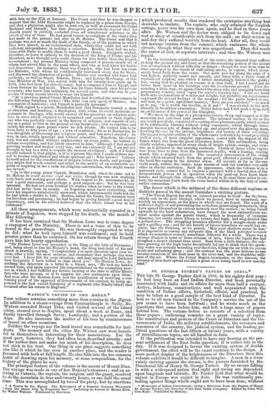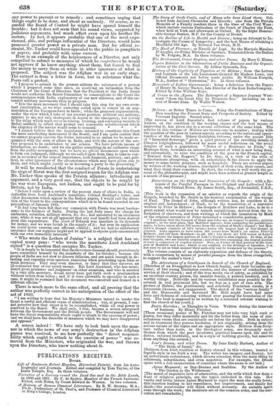ST. GEORGE TUCKER'S PAPERS ON INDIA."
THE late St. George Tucker died in 1851, in his eighty-first year : he had long been an East Indian Director, and been personally associated with India and its affairs for more than half a century. Active, laborious, conscientious, and well acquainted with the condition of Indian affairs, historical, official, and practical, he may be taken as a good sample of the best kind of Director. To him as to all men trained in the Company's service the use of the pen seems to have been habitual ; and he wrote much on the questions that came before him, and left a large mass of papers behind him. The volume before us consists of a selection from those papers ; embracing remarks on a great variety of topics. The constitution and powers of the Court of Directors and the Go- vernments of India, the military establishments, the revenues and resources of the country, the judicial system, and the leading po- litical questions of the last fifteen or twenty years, with a variety of miscellaneous topics, are all handled in turn.
If the publication was intended to have any bearing on the pre- sent settlement of the East India question, it is rather late in the day. If it was designed to favour the existing system of double government, the effect will be the exact contrary to the design. A more perfect display of the helplessness of the Directors than this volume exhibits it would be difficult to imagine. A man in a river vainly striving against the stream, is the picture furnished by the Directorial life of Henry St. George Tucker. By no means falling in with a widespread notion that right and wrong are dependent upon longitude and latitude, Mr. Tucker held that what would be unjust in Europe was unjust in Asia. He was continually pro- testing against things which ought not to have been done, without
• Memorials of Indian Government; being a Selection from the Papers of Henry St. George Tucker, late Director of the East India Company. Edited by John Wil- liam Kaye. Published by Bentley. any power to prevent or to remedy ; and sometimes urging that things ought to be done, and about as uselessly. Of course, as re- garded the Board of Control he might have spared himself the trouble ; but it does not seem that his sound views, supported by judicious arguments, had much effect even upon his brother Di- rectors. In fact, it appears probable that one of the most expe- rienced, able, and perhaps influential of the Directors, would have possessed greater power as a private man. But for official re- straint, Mr. Tucker could have appealed to the public in pamphlets or papers, and probably with some success. Here is an example of the helplessness of a Director, not only compelled to submit to measures of which he conjectures he would not approve if he knew anything about them, but forced to find the money to carry them on while in utter ignorance of what is proposed. The subject was the Affghan war in an early stage. The extract is from a letter in form, but in substance what the Peers call a protest. " I propose to submit in the present address the substance of a protest which I prepared some time since, on receiving an intimation from the Chairman of the Court of Directors that the President of the India Board would not authorize the Secret Committee to communicate to the Court the correspondence with India explanatory of our new alliances, and of the ex- tensive military movements then in progress.
" It is the more necessary that I should take this step for my own even- tual justification, as we were yesterday called upon to concur in an aug- mentation of the European force in India ; while the proposed augmentation, under the view which I take of our present position, political and military, appears to me not only inadequate in degree to the emergency, but (owing to the delay which must occur in raising, training, and conveying recruits to India) unlikely to afford that prompt and seasonable reinforcement which the exigency of the service would seem to demand. " I cannot believe that the Legislature intended to constitute this Court the mere unreflecting instrument of the Board ; and I am quite certain that we cannot properly execute the duties intrusted to us unless we be made ac- quainted with the state of affairs in India, and with the nature of the ser- vice proposed to be undertaken by our armies. We have private means of information, no doubt; and we can gather something in an authentic shape from the public newspapers; but we have no official documents upon which to form our judgment, although we are called upon from time to time to con- cur in measures of the utmost importance, both financial, military, and poli- tical, in utter ignorance of the circumstances which may have given rise to them, and which might justify us in becoming a party to the proceeding."
It will be recollected that the conduct of Persia in undertaking the siege of Herat was the first assigned reason for the Affghan war. Mr. Tucker thus speaks of the Persian alliance ; introducing an argument, and a very good one, that the objects to be sought by the war were European, not Indian, and ought to be paid for by Britain, not by India.
"Before I enter upon a review of the present state of affairs in India, as deducible from Lord Auckland's manifesto, Colonel Stoddart's letter, and other documents which appear in the Indian papers, I would call the atten- tion of the Court to the correspondence which is to be found recorded in our proceedings of January 1835.
"It had long been felt that our connexion with Persia was most burden- some to the finances of India. During the last forty years the charge for embassies, subsidies, military stores, &c. &c., had amounted to an enormous sum, while it was not at all apparent that any real benefit had been derived from this expenditure. The court of Teheran was insatiate in its demands for money, and we were lavish in the supply of it; but over its application we could never exercise any efficient control ; and we had no satisfactory assurance that our supplies might not be applied to objects quite unconnected with our own immediate interests."
"Who wrote the Letters of Tunius " is a subject that has oc- cupied many pens : " who wrote the manifesto Lord Auckland signed" is a question that occupies Mr. Tucker.
"It is deeply to be lamented that the Governor-General should gratuitously have committed himself by the manifesto of the 1st October ; because the people of India are not slow to discern fallacies, and are quick enough in de- tecting and exposing even specious reasoning when proceeding upon false or weak premises. They may even discover, or fancy that they discover, an ill-concealed fear of our secret enemy. But Lord Auckland, who has mani- fested great prudence and judgment on other occasions, and who is assisted by a very able secretary, would never have put forth such a proclamation without orders from hence ; and if it were allowable to speculate in such a case, it might be surmised that the document was conceived and framed in a different officina."
There is much more to the same effect, and all proving that the author was perfectly correct in his anticipation of the effect of the act of 1833.
"I am willing to hope that his Majesty's Ministers intend to render the Court a useful and efficient organ of administration; but, at present, I can- not perceive how that object is to be accomplished, while all real power is reserved to the Board. We shall only, I fear, become a screen interposed between the Government and the British people. The Government will not have the direct responsibility which ought to attach to the exercise of power ; and we shall have the discredit of measures which we may have disapproved and opposed."
A screen indeed ! We have only to look baok upon the man- ner in which the news of our army's destruction in the Affghan passes was received, to see how perfectly the " direct responsi- bility which ought to attach to the exercise of power " was re- moved from the Ministers, who originated the war, and thrown upon the Directors, who knew nothing about it.



























 Previous page
Previous page